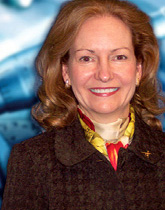The junior electrical engineering major sits inside Porter Hall and arranges her materials on the table. She and a few of her engineering classmates have worked extensively throughout the semester on a group project that involves futuristic interactive television and its potential impact on people's lives and the educational system. They've made class presentations at various stages; today is their final presentation, and it will be to industry professionals.

"It's funny," laughs Jane Rudolph, now sitting at her desk at Lockheed Martin Corp. "That was 1978, more than 30 years ago, and we didn't really have the Internet yet, but what we came up with for interactive television as a group was essentially what people use the Internet for education and training today."
The group earned an A in the course for their visionary thinking, but Rudolph says she took away from the course much more than just a good grade. "I think the biggest influence on my career was the project courses at Carnegie Mellon. They were more than just solving problems out of the textbook," she says. "They were applying what you were learning to something more tangible, more real. The study groups, the group activities—that's what it's like at work, working with a team."
The team player concept has served Rudolph well at Lockheed Martin, where she has been involved in projects with scopes as far reaching as her undergraduate engineering project. For instance, she helped design air-traffic management systems and also national security defense systems, doing everything from working hands-on integrating complex algorithms into Navy submarine systems with other engineers to answering emails of the employees she manages. During her tenure, she's moved up the corporate ladder to become a vice president at the Maryland-based corporation.
Rudolph says she hasn't forgotten the role Carnegie Mellon played in establishing her career. In fact, since earning her bachelor of science degree in electrical engineering in 1979, she has been a consistent donor to the university, financially and with her time. She routinely accepts invitations to return to campus to speak with students about career opportunities at Lockheed Martin and in engineering in general. Most recently, she and three other engineering experts spent a day at Carnegie Mellon as panelists during a national student conference, titled "Creating Cultures of Innovation," which was designed to help students improve leadership skills and gain career advice. Eta Kappa Nu honor students from more than 28 universities attended, making it standing room only in the packed Roberts Hall auditorium.
In her remarks, Rudolph recounted the excitement and versatility she has found in her profession, hoping to convince her audience to pursue careers in engineering, too. As the conference drew to a close, she spotted an undergraduate, hand raised, who had a question seemingly on the mind of many: Should I get a job in the industry or go to grad school? Rudolph, upon hearing the question, reflected on her own experiences with what she learned on the job and in the classroom. "Do both," she answered.



